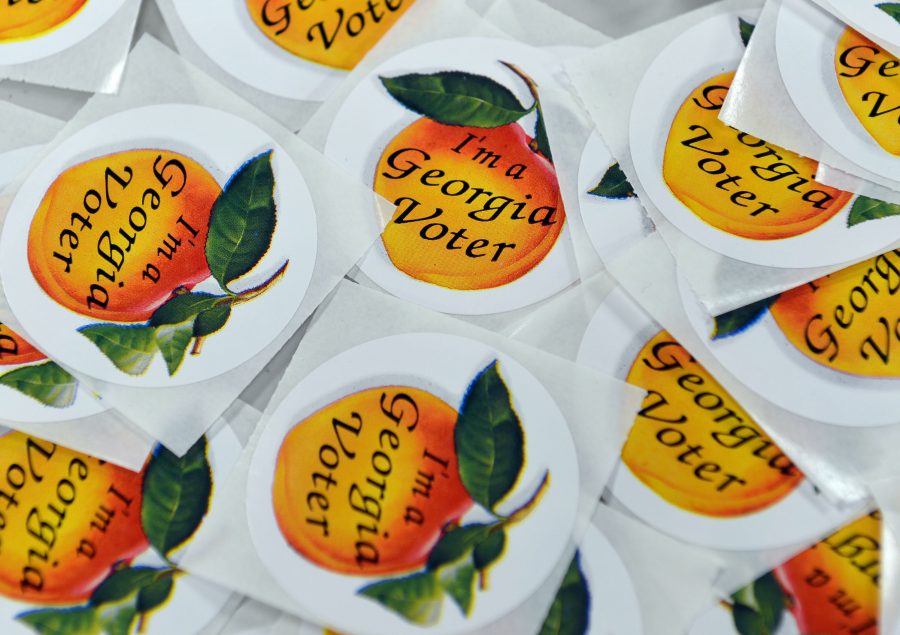Disillusionment doesn’t excuse political inaction
November 2, 2012: Georgia voters stickers at the Sandy Springs polling location Friday November 2, 2012. BRANT SANDERLIN / [email protected]
April 27, 2016
Famed intellectual Marshal McLuhan once wrote, “American youth attributes much more importance to arriving at driver’s license age than at voting age.”
For the most part, it seems that McLuhan was right. In recent elections, voter turnout has reached abysmal lows, particularly among younger age groups. Voter turnout, calculated by the U.S. Census as a proportion of the voting-eligible population (i.e., citizens 18 and older), was only 41.9 percent during the 2014 midterms. And while Congressional elections are known to have a lower turnout than presidential ones, this number is still the lowest turnout rate in 70 years.
The statistic McLuhan would have found most upsetting, however, is the 2014 midterm turnout rate in the 18-24 age group: a shocking 23.1 percent.
This number should enrage young people everywhere. The difference between the voting and eligible populations in the age group was -13.2 percentage points in 2014. For all ages 45 and older, this difference was positive, and as high as 8.3 points. All these numbers mean that older population groups have a disproportionate influence on national elections, leaving younger groups to live with the consequences.
In such a polarized political climate, it seems strange that young people would remain unmotivated to vote. What could possibly be keeping them from the polls?
The Economist offers a changing socioeconomic landscape as a possible reason for low youth turnout. Many Millennials have little to lose during the nation’s economics ups and downs because of their tendency to own less property and marry later than previous generations.
At first, this explanation seems plausible. Perhaps young people are uninterested in voting simply because political issues don’t affect them. At least for senior Logan Smith, this idea holds true. “Personally, in large-scale issues, I don’t feel that I have a stake,” he said.
But when the future of issues like employment, immigration and healthcare hangs in the balance of elections, is this level of apathy really possible?
Paradoxically, Smith also considers himself “more politically involved than the average person.” According to the Atlantic, this seemingly contradictory view of political activism is common among young people.
While volunteerism among Millennials is on the rise, turnout at the polls continues to drop. Rather than being caused by disinterest, these low voter-participation rates evidently arise from a disillusionment with current political processes.
“The way the conventions work seems unfair,” Smith said of the presidential nomination process. “Party officials have too much influence, and it seems like our votes don’t count.”
These kinds of concerns have never been more relevant, as talk of a contested Republican convention continues to circulate, and accusations of voter suppression from Arizona to New York have become particularly problematic on the Democratic side.
Senior Evan Johnson agreed with Smith, calling democracy “a game that one man cannot change.”
While this distrust of establishment politics is clearly justified, simply deciding to opt-out of the political process altogether is not a solution. To argue against the significance of “one man’s” vote is to ignore the true importance of voting.
Millennial or not, the outcomes of political races affect each any every one of us. The next president, for example, may appoint up to four new supreme court justices, hugely affecting decisions in controversial cases with topics ranging from immigration to abortion rights.
Even if a single vote can’t swing every election, it can make a statement to elected officials. In this year’s Democratic primaries, for example, Bernie Sanders has come from relative obscurity to gather a sizable national following. While most experts agree that Hillary Clinton’s nomination is inevitable, the Democratic voters have spoken, and their dissent has been voiced.
In this case, the significance of increased voter participation will not be apparent in the outcome of the election. Rather, it will become evident over time, as the Democratic party changes its policies and strategies to better align with voters’ opinions.
Someone who agrees with this sentiment may argue that the Democratic party– and American politics as a whole–is too deeply corrupt to bring about real change. And they may be right. Undoubtedly, voting is not enough. Political activism, like the recent Democracy Spring protests, is also necessary to bring about change.
But those who use political corruption as an excuse to forgo voting completely are simply missing the point of these protests. The group’s leaders advocate not only for the end of corruption, but also the end of voter suppression. True supporters of this type of cause would understand that political activism and voting must go hand-in-hand.
For most, achieving suffrage has been a hard-fought battle. Women received the right to vote less than 100 years ago. We live only a few decades removed from the Voting Rights Act of 1965. In 1971, the voting age was finally lowered to 18. And the battle is far from over, as a federal judge just ruled North Carolina’s strict voter I.D. law constitutional. This law is just one of many of its kind that could disenfranchise millions across the country.
Throughout this country’s history, people have had to fight for their right to vote. To simply abstain from voting is to throw away a vital tool of democracy and stay silent when voicing an opinion could change the future of the nation.
No one can claim to be above politics. The systems that drive this country touch each and every person within our borders, and beyond. Voting without any deeper involvement is certainly an empty gesture. But no political transformation can happen in this country without voting.







